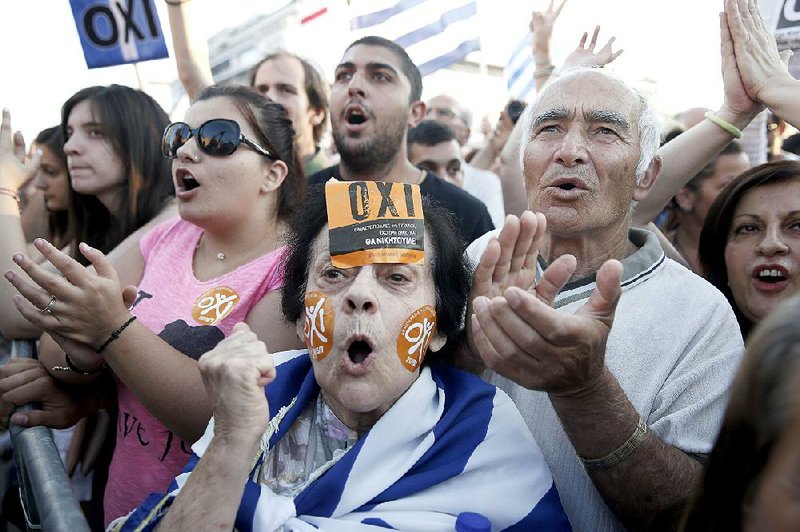ATHENS, Greece -- Greek and European leaders dug into their positions before a Sunday referendum on the nation's debt crisis, as polls showed the outcome is impossible to predict and what happens next even more uncertain.
Officials from Berlin to Madrid reiterated that a vote of no on the latest proposals by creditors would deepen Greece's economic misery. Greek Prime Minister Alexis Tsipras told supporters in Athens that a no vote was the ticket out, as he appealed for a 30 percent cut in his nation's debt.
"The bigger the no vote," Tsipras said, "the better agreement we'll achieve."
Five months of confrontation on Greece's debt problem have yielded little more than economic malaise and political mistrust. Banks in Greece remained shut, and pensioners were coping with rationed payments, giving the country a glimpse of the financial and social catastrophe that could await without an aid agreement.
"You'd like to think that if the vote is very narrowly yes, the Greek government admits defeat," said Philip Shaw, chief economist at asset manager Investec in London. "But over the last 5 1/2 years, the Greek crisis has had a history of throwing up the unexpected. This could just be the beginning of another very complex chapter."
Greece's highest administrative court ruled Friday that the referendum planned for Sunday is constitutional, clearing the last serious hurdle before Greeks go to the polls for a vote that could set the country's direction for decades.
The referendum has been sharply criticized by European officials for the breakneck pace at which it was organized and the lack of clarity in a ballot question laced with technical jargon.
Valdis Dombrovskis, the commissioner for the euro, told Germany's Die Welt newspaper that the question is "neither factually nor legally correct," noting that it asks voters to issue a verdict on a European proposal that has already been withdrawn.
Alexandros Bistis, a top Tsipras adviser, said that despite the language, "the people know what this means."
But within Greece, there are sharp divisions over what the referendum represents.
To the leftist government and other "no" supporters, Sunday's referendum offers voters an up-or-down choice on Europe's latest cuts-for-cash bailout plan -- even though the offer expired Tuesday, along with Greece's international financial lifeline.
To the opposition and those backing a yes vote, the choice is between sticking with Europe or going it alone.
On Thursday, Finance Minister Yanis Varoufakis said he will resign if Greece votes yes, raising the prospect that Greece will be choosing whether to bring down its government. Tsipras, whose Syriza party was elected five months ago on a wave of anti-austerity anger, declined to say whether he would resign if the referendum goes against him.
Amid reports that ATMs were running so low on cash that they could run out by Monday, both sides of the referendum debate staged final rallies in central Athens on Friday night, forcing hotels and shops to pull down shutters and closing main streets.
Police estimated both the "no" event in Syntagma Square and the "yes" rally at the Panathenaic Stadium each drew more than 20,000.
Clashes broke out briefly Friday evening between leftist factions and the police at the rally supporting the no vote. Angry protesters advanced on police after they fired tear gas and dragged a person to the ground. As police retreated, the demonstration continued calmly.
Calling for national unity, Tsipras reiterated his insistence that the referendum would be a vote on a bad deal for Greece rather than a referendum on its continued membership in the single-currency eurozone.
"On Sunday, it's not Greece's participation in the euro that's at stake," Tsipras said. He has argued that a successful no vote will give him the leverage he needs to negotiate the bailout on better terms for Greece.
"On Sunday, we won't simply be deciding to remain in Europe, we'll be deciding to live with dignity in Europe," Tsipras said from a stage in front of the Parliament building. "We're celebrating overcoming fear, overcoming blackmail."
At the "yes" event, opposition leader Antonis Samaras said rejecting the bailout would be seen by creditors as a rebuke of the euro and would keep banks closed longer.
Multiple polls showed that Greeks were split down the middle as the vote approached.
Voting is open from 7 a.m. to 7 p.m. Sunday. Emergency negotiations will ensue afterward, in an effort to keep Greek banks from running out of cash. The European Central Bank will discuss their emergency lifeline Monday.
Euro-area finance ministers have said they may be ready to start work on a third bailout for Greece even if voters reject their last proposal, according to two officials familiar with negotiations. Varoufakis, the finance minister, said he expects a deal to be done regardless of the result.
Europe may have to get used to Greece being "in bankruptcy" while remaining in the euro, European Union President Donald Tusk said in an interview with Politico.
European stocks fell for a second day Friday, and German bonds gained as the referendum approached
The Stoxx Europe 600 Index decreased 0.5 percent at the close of trading, while the euro strengthened 0.1 percent.
More than two shares declined for every one that advanced in the Stoxx 600, with trading volumes 36 percent lower than the 30-day average, according to data compiled by Bloomberg. The gauge, which tumbled 2.7 percent on Monday after Tsipras's surprise announcement, has dropped 3.4 percent this week.
Whatever comes after the referendum, the clock is ticking for Greece as it holds out for a better deal.
Tsipras on Friday argued that the only way for Greece's debt to become sustainable is for a so-called haircut and a 20-year grace period. The International Monetary Fund said in a report Thursday the country needs $56 billion from its European partners and better terms to stand on its own feet.
On the streets of Athens, people expressed worry about what would happen after the referendum.
Christopher Salinis, 36, was manning the counter at his coffee bar Thursday. He opened it a year ago, full of optimism during the first signs of recovery after years of economic devastation for Greece. But three months ago, he halted work on renovations and now is waiting to see which direction his country takes.
"The government hasn't explained how this will all work out if we vote no," he said. "I'm afraid I'm going to have to close my shop. I'm afraid the people won't have money to buy coffee. I'm afraid. I'm afraid. I'm afraid."
Evgenia Bouzala, a Greek born in Germany, said Friday that she was considering shutting down her olive oil export business because of the financial turmoil.
"I don't think we can keep going. Look at what happened in the last three days. Imagine if that lasts another six months," she said.
"A yes vote would bring a caretaker government, and that would probably be better. ... We have to start over."
Information for this article was contributed by Nikos Chrysoloras, Matthew Campbell, Eleni Chrepa, Rebecca Christie, Karl Stagno Navarra, Birgit Jennen, Brian Parkin, Corina Ruhe, Nick Gentle and Stephen Kirkland of Bloomberg News; by Griff Witte, Ylan Q. Mui and Brian Murphy of The Washington Post; by Dan Bilefsky, Dimitris Bounias, Liz Alderman and Suzanne Daley of The New York Times; and by Derek Gatopoulos, Menelaos Hadjicostis, Elena Becatoros, Costas Kantouris, Geir Moulson and Michael Corder of The Associated Press.
A Section on 07/04/2015


